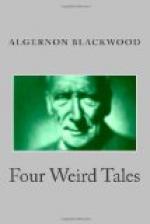“Nothing but this hand-bag?” laughed the other, thinking he was joking.
“And a small portmanteau in the van,” was the quiet reply. “I have no other luggage.”
“You have no other luggage?” repeated Laidlaw, turning sharply to see if he were in earnest.
“Why should I need more?” the professor added simply.
Something in the man’s face, or voice, or manner—the doctor hardly knew which—suddenly struck him as strange. There was a change in him, a change so profound—so little on the surface, that is—that at first he had not become aware of it. For a moment it was as though an utterly alien personality stood before him in that noisy, bustling throng. Here, in all the homely, friendly turmoil of a Charing Cross crowd, a curious feeling of cold passed over his heart, touching his life with icy finger, so that he actually trembled and felt afraid.
He looked up quickly at his friend, his mind working with startled and unwelcome thoughts.
“Only this?” he repeated, indicating the bag. “But where’s all the stuff you went away with? And—have you brought nothing home—no treasures?”
“This is all I have,” the other said briefly. The pale smile that went with the words caused the doctor a second indescribable sensation of uneasiness. Something was very wrong, something was very queer; he wondered now that he had not noticed it sooner.
“The rest follows, of course, by slow freight,” he added tactfully, and as naturally as possible. “But come, sir, you must be tired and in want of food after your long journey. I’ll get a taxi at once, and we can see about the other luggage afterwards.”
It seemed to him he hardly knew quite what he was saying; the change in his friend had come upon him so suddenly and now grew upon him more and more distressingly. Yet he could not make out exactly in what it consisted. A terrible suspicion began to take shape in his mind, troubling him dreadfully.
“I am neither very tired, nor in need of food, thank you,” the professor said quietly. “And this is all I have. There is no luggage to follow. I have brought home nothing—nothing but what you see.”
His words conveyed finality. They got into a taxi, tipped the porter, who had been staring in amazement at the venerable figure of the scientist, and were conveyed slowly and noisily to the house in the north of London where the laboratory was, the scene of their labours of years.
And the whole way Professor Ebor uttered no word, nor did Dr. Laidlaw find the courage to ask a single question.
It was only late that night, before he took his departure, as the two men were standing before the fire in the study—that study where they had discussed so many problems of vital and absorbing interest—that Dr. Laidlaw at last found strength to come to the point with direct questions. The professor had been giving him a superficial and desultory account of his travels, of his journeys by camel, of his encampments among the mountains and in the desert, and of his explorations among the buried temples, and, deeper, into the waste of the pre-historic sands, when suddenly the doctor came to the desired point with a kind of nervous rush, almost like a frightened boy.




